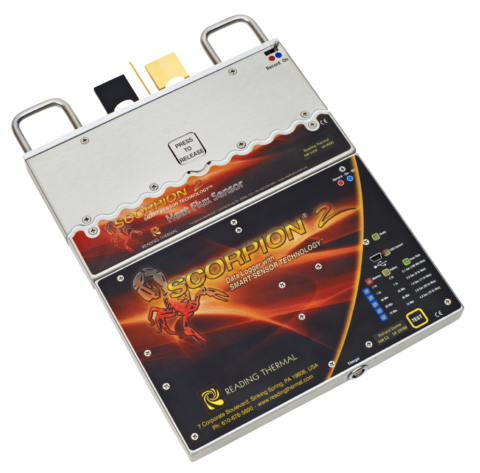Owners and operators of commercial bakeries must be concerned with a wide range of food safety considerations, including food borne illnesses, shelf stability, allergen control, and sanitation programs.
Reading Thermal, a Reading Bakery Systems brand located in Sinking Spring, PA, has been focused on measuring and understanding the commercial baking process for over 25 years. We manufacture and support the SCORPION® 2 Profiling System which measures and maps the key baking parameters of temperature, air velocity, heat flux and humidity.
The SCORPION® 2 Profiling System enables you to monitor actual in-process conditions and get the critical information you need to correct any problems and maintain optimum process control. This powerful diagnostic tool has become an industry standard for understanding and improving bakery proofing, baking, cooling and freezing processes, and for FSMA kill-step validation.
Food Safety Concerns
As consumers focus more closely on what they’re eating, they are putting a premium on safe food. They want to eat high-quality food made of high-quality ingredients without fearing any adverse effects or food-borne illness.
Temperature: Oven temperature causes physical and chemical reactions in dough/batter. Insufficient or excessive temperature during baking can lead to changes in fermentation and humidity levels, as well as undesirable changes in color, texture and taste. Not to mention the internal food temperatures that impact food borne pathogens.
Scientific proof is the only way to confirm that your baking process is consistently delivering the desired lethal result to ensure the destruction of pathogenic microorganisms.
The Scorpion® 2 Temperature Sensor Array measures temperature at product level, in fixed positions across the conveyor, and delivers a true representation of what the product experiences over time. Different types of pluggable sensors are available, including one designed for solid or tight mesh conveyors and one for open mesh conveyors.
Humidity: Oven humidity is a measurement of the moisture in the air. The moisture often comes from the product itself and represents a delicate balance that affects finished product quality in many ways; e.g., the amount of moisture left in a pretzel can affect its shelf life, while reduced evaporation can keep the surface of a cookie moist, allowing it to stretch, preventing cracks. The SCORPION® 2 Humidity Sensor measures the absolute moisture content of the thermal environment in both your heating and cooling processes.
Air velocity: Oven air velocity is the measurement of airflow inside the oven. The measurement is important because, along with other parameters, air velocity influences the coloration, texture, firmness, and baking time of your final product. Oven air velocity can be measured and recorded with the SCORPION® 2 Air Velocity Sensor. The sensor array delivers a precise picture of airflow patterns inside the oven from side to side and end to end.
Heat flux: Oven heat flux is the amount of energy transferred per unit area per unit time from or to a surface. Many bakers use oven heat flux profiles when trying to produce the same product on two different lines or when trying to transfer product from one line to another. The two lines will produce the same product when the heat flux profiles match. The SCORPION® 2 Heat Flux Sensor is designed to measure convective and radiant heat fluxes at product level and display the results in Btu/hr·ft2 or W/m2.
It’s the responsibility of commercial bakeries and food manufacturers to ensure the monitoring of food safety consideration as well as food quality. With the help of Reading Thermal, your products will bake to perfection. Contact us online, or call us at (610) 678-5890 Ext. 2 to learn more.

